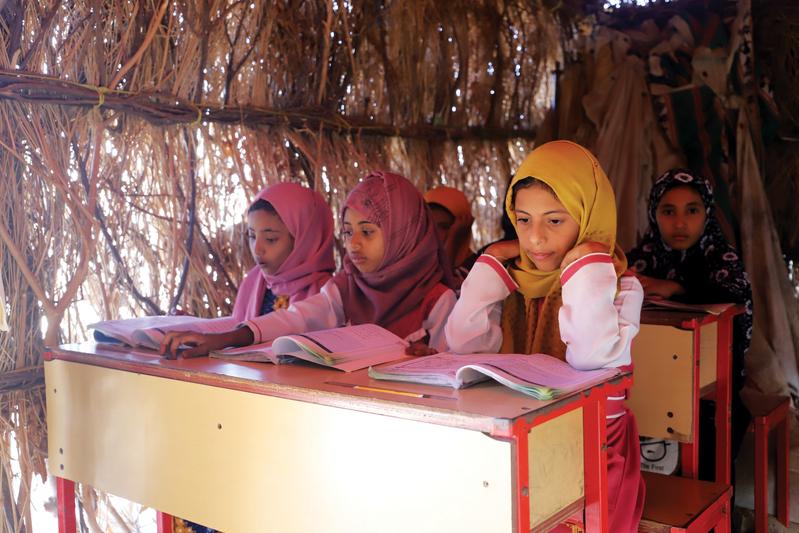Millions of people in war-torn country may be deprived of aid as UN funding drive falls short
 Children attend school in a makeshift classroom in Hajjah, Yemen, on Feb 23. (PHOTO / XINHUA)
Children attend school in a makeshift classroom in Hajjah, Yemen, on Feb 23. (PHOTO / XINHUA)
The humanitarian situation in war-torn Yemen is in danger of being forgotten by the world after the United Nations managed to raise only $1.2 billion on Feb 27, well short of its funding target of $4.3 billion, said nongovernmental organizations.
They said that though hitting funding targets has always been challenging, the difference this time is that the Ukraine-Russia conflict has driven fuel and food prices up. Relief efforts have also been diverted to the recent twin earthquakes in Turkiye and Syria, thus putting some 20 million Yemenis at risk this year.
Independent humanitarian organization the Norwegian Refugee Council hit out at the Yemeni funding outcome in a statement, saying it was “woefully inadequate” and gave a signal that “some humans are less valuable than others”.
News of the funding shortfall came as world leaders gathered on March 5 in Doha, Qatar, for a UN conference on the Least Developed Countries, seeking to accelerate sustainable development that focuses assistance on those most in need.
On March 6, Faid Mujli, Vice-President of the Presidential Leadership Council of Yemen, said he welcomed the Doha Programme of Action that was adopted at the meeting. According to the UN, the program aims to renew strengthened commitments between LDC and various stakeholders between 2022 and 2031.
Mujli urged that priority be given to states facing conflict and said that his country was “undergoing exceptional circumstances” following the coup and wars.
While humanitarian suffering and economic deterioration have continued in Yemen since the Houthi coup in 2014, Mujli said the government has been working to promote resilience, early recovery and reconstruction in partnership with Saudi Arabia. He called on the international community to support the Yemen government in addressing the economic consequences and alleviating the suffering caused by the war.
The UN estimates that 21.6 million people in Yemen — nearly three-quarters of its population — will require humanitarian assistance and protection this year.
Karl Schembri, NRC regional media adviser for East Africa and Yemen, said that the “huge outpour of solidarity” — be it with the people of Ukraine, Turkiye or Syria — should “never happen at the expense of millions of Yemenis” who have been suffering for the last eight years “in this completely man-made situation”.
He said that some Western and Arab countries which have donated to Yemen have had a “huge say” in the Yemeni war, “either in the bombs they are dropping or in the weapons they are selling”.
Civil war in Yemen broke out in 2014, after the Houthi rebels’ seizure of the capital Sanaa, eventually leading to the collapse of the internationally recognized government of President Abd-Rabbu Mansour Hadi. A military coalition of countries intervened into Yemen in 2015, but it has since struggled to defeat the rebels.
“These countries have, particularly, an extra responsibility in making sure the disaster they helped create is mitigated for these millions of poor civilians who have no say,” said Schembri.
In December, UN Secretary-General Antonio Guterres said that a record $51.5 billion would be needed to help 230 million of the world’s most vulnerable people in nearly 70 countries for 2023.
He explained that this covered countries that had been hit by lethal droughts and floods, from Pakistan to the Horn of Africa. In addition, the conflict in Ukraine has “turned a part of Europe into a battlefield”.
Hussein Alsuhayli, chairman of the Tamdeen Youth Foundation in Sanaa, said that the Yemeni crisis “has become very long” and that the failure to hit funding targets may force agencies and organizations in Yemen to reduce the number of assisted people as well.
“Millions of Yemenis stand at a crossroads, in light of fears of the double standards of major countries regarding the crises of third world countries, including Yemen, and the donor community’s departure towards other crises, which leads to the depletion of funds directed to financing the humanitarian response and fighting hunger in Yemen,” said Alsuhayli.
“Also, the big and wealthy countries seek to provide aid in a way that they reap greater political benefits, through their own organizations.”
Alsuhayli said much needs to be done to push for comprehensive peace in Yemen and “end the human tragedy, which is approaching its ninth year”.
Meanwhile, a group of Yemenis had filed a lawsuit in a US district court against American arms manufacturers Raytheon, Lockheed Martin, and General Dynamics, according to the Lebanon-based Al-Mayadeen Media Network.
The complainants accused the US firms of “aiding and abetting war crimes and extrajudicial killings” by supplying weapons to the Saudi-led coalition in Yemen. The lawsuit was filed on behalf of the plaintiffs by Terrence Collingsworth of International Rights Advocates after the Campaign Against Arms Trade, a UK-based campaign organization.


